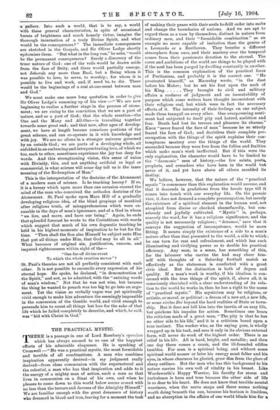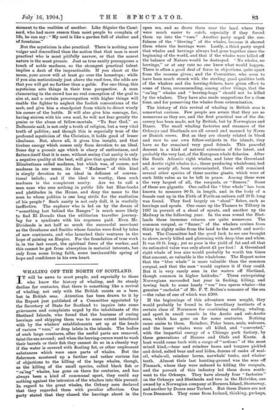• and terrible of all combinations. A man who combines
inspiration apparently derived—in my judgment really derived—from close communion with the supernatural and the celestial, a man who has that inspiration and adds to it the energy of a mighty man of action, such a man as that lives in communion on a Sinai of his own, and when he pleases to come down to this world below seems armed with no less than the terrors and decrees of the Almighty Himself." We are familiar enough with the great dreamers of history who dreamed in blood and iron, leaving for a moment the task of making their peace with their souls to drill order into mobs and change the boundaries of nations. And we are apt to regard them as a race by themselves, distinct in nature from ordinary men, and their "formidable combination" as an example no more capable of imitation than the genius Of a Leonardo or a Beethoven. They breathe a different atmosphere from ours, and their mastery over the temporal comes from their passionate devotion to the eternal. The cares and ambitions of the world are things to be played with if the soul has been purged by dwelling constantly in another. This is the common explanation of the practical forae of Puritanism, and probably it is the correct one. "He prostrated himself," as Macaulay wrote, "in the dust before his Maker; but he set his foot upon the neck of his King They brought to civil and military affairs a. coolness of judgment and an immutability of purpose which some writers have thought inconsistent with their religious zeal, but which were in fact the necessary effects of it. The intensity of their feelings on one subject made them tranquil on every other. One overpowering senti- ment had subjected to itself pity and hatred, ambition and fear. Death had lost its terrors and pleasure its charms." Knox "never feared the face of man" because he so utterly feared the face of God; and doubtless their complete pre- occupation with the things of the spirit explains their con- temptuous mastery over the things of the world. They succeeded because they were free from the follies and frailties which make man's work ineffectual. But if this . were the only explanation, the character would have to be limited to the -" daemonic" men of history,—the few saints, poets, prophets, and crusaders who have been in the world but never of it, and yet have above all others moulded its destiny.
We believe, however, that the nature of the "practical mystic "is commoner than this explanation would assume, and that it descends in gradations from the heroie type till it comes into touch with our everyday life. On the prosaic view, it does not demand a complete preoccupation, but merely the existence of a spiritual element in the human soul, not atrophied from disuse or checked shamefacedly, but con- sciously and joyfully cultivated. " Mystic " is, perhaps, scarcely the word, for it has a religious significance, and the quality is not necessarily religious ; "dreamer," save that it conveys the suggestion of incompetence, • would be more fitting. It means simply the existence of a side to a man's nature other than that presented to the world, a side to which he can turn for rest and refreshment, and which has such illuminating and vivifying power as to double his practical efficiency. Any " man, in a sense, has something of this, for the labourer who carries the hod may cheer him- self with thoughts of a Saturday football match as effectively as the statesman is comforted with a great civic ideal. But the distinction is both of degree and quality. If a man's work is worthy, if his idealism is con- cerned with the true things of the spirit, if, above all, it is Consciously cherished with a clear Understanding of its rela- tion to the world be works in, then he has a right to the name of "practical mystic." His mysticism may be religious; or artistic, or moral; or political : a dream of a new art, a new life, or some eivitas Dei beyond the hard realities of State or town- ship. But it does not lull him into the inertia of an easy life, but quickens his impulse for action. Sometimes one hears the criticism made of a great man, "The pity is that he has no other side to his life," and it is a criticism based upon a true instinct. The worker who, as the saying goes, is wholly wrapped up in his task, and sees it only in its obvious external form, will never do work of the highest order. There is no relief in his life. All is hard, bright, and metallic; and then one day there comes a crash, and the ill-founded edifice tumbles. For man is a spiritual being, and without some spiritual world sooner or later his energy mud falter and his eyes, in whose clearness he gloried, grow dim from the glare of sharp outlines. But the man who has this background to his nature carries his own well of vitality in his breast. Like Wordsworth's Happy Warrior, his faculty for storm and turbulence is keen and true because the other aide of life is so dear to .his heart. He' does not know that terrible mental weariness, when the nerve snaps and there seems nothing worth doing beneath the sun, because his horizon is limitless, and no absorption in the affairs of one world blinds him for a
liOment to the realities of another. Like Segnier the Cami- iaard, who had more reason than most people to complain of life, he can say : "My soul is like a garden full of shelter and of fountains."
But the mysticism is also practical. There is nothing more vulgar and discredited than the notion that that man is most practical who is most pitifully narrow, or that the sanest nature is the most prosaic. Just as true sanity presupposes a touch of noble madness, so the strongest practical talent implies a dash of the impracticable. If you shoot at the moon, your arrow will at least go over the housetops ; while if you aim meticulously just above the roof-tree, the odds are that you will get no farther than a gable. For one thing, this mysticism sets things in their true perspective. A man clamouring in the crowd has no real conception of the goal to aim at, and a certain preoccupation with higher things will enable the fighter to neglect the foolish conventions of the mob, and give him a standpoint from which to direct wisely his corner of the battle. It will also give him courage, for, having striven with his own soul, he will not fear greatly the praise or the abuse of fellow-mortals. "To fear God," as Dalhousie said, is not only a truth of religion, but a very vital truth of politics; and though this is especially true of the profound mysticiem of the Christian, it holds good of lesser idealisms. But, above all, it gives him insight, and that tireless energy which comes only from devotion to an ideal. Some day a prosaic age which is chary of enthusiasm, and flatters itself that it is sane, without seeing that sanity is only a negative quality at the best, will give that quality which the Elizabethans called madness, but which was, of course, not madness in our sense, its due. " Madness " of this kind is simply devotion to an ideal in defiance of conven- tional beliefs ; and if the ideal is worthy, then such madness is the completest sanity. Are we to call a man sane who sees nothing in public life but Blue-books and platitudes in the House, and deny the name to the man to whom politics is one long strife for the exaltation of his people ? Such sanity is not only dull, it is woefully ineffective. The explorer who is led on by the dream of 'something lost behind the Ranges" is much more likely to find El Dorado than the utilitarian traveller journey- ing for a syndicate with his expenses paid. Even Mr. Dividends is not half so much the successful merchant as the Greshams and Smiths whose fancies were fired by tales of new continents, and who launched their ventures in the hope of gaining an Empire. For the foundation of true work is, in the last resort, the spiritual force of the worker, and this cannot be got from absorption in material interests, but only from some living faith, some inexhaustible spring of hope and confidence in his own heart.



































 Previous page
Previous page